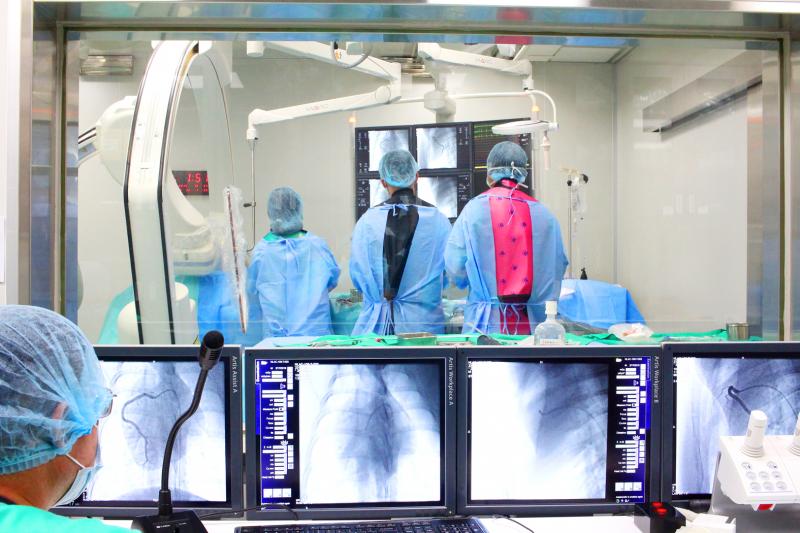A blood vessel imaging system installed at the National Laboratory Animal Center could help researchers develop a treatment for cardiovascular disease in humans, the center said yesterday.
The center, based at the National Biotechnology Research Park in Taipei’s Nangang District (南港), is one of the National Applied Research Laboratories’ (NARL) eight centers.
Center director Yu Chun-Keung (余俊強) and Hung Kuan-yu (洪冠予), the superintendent of National Taiwan University Hospital’s Hsinchu Branch, yesterday signed a memorandum of understanding (MOU) at a ceremony in Taipei, with NARL president Wang Yeong-her (王永和) serving as a witness.

Photo courtesy of the National Laboratory Animal Center
Cooperation between the two institutions would speed up the clinical application of innovative techniques developed by the hospital, while NARL offers other research resources related to semiconductor, information and communications technologies, Wang said.
Demand for oncological, cardiovascular and neurological testing for animals has been increasing, so the center last year spent NT$30 million (US$989,576) installing a biplane angiography system in its laboratory at the Hsinchu Biomedical Science Park, center associate research fellow Su Yu-chia (蘇裕家) said.
The system can provide 3D X-ray images of animals in real time, which enables veterinarians to see the structures of animal organs while performing surgery and increases the success rate of the surgeries, he said.
Techniques such as computed tomography and magnetic resonance imaging also produce 3D images, but they do not allow surgeons to take images during surgery, Su said.
The MOU would allow physicians at the hospital who want to develop new treatments for cardiovascular disease in humans to use the center’s imaging system to first try the treatments on laboratory animals, he said.
The institutions would jointly develop innovative medical techniques, such as navigating inside bronchial tubes, treating various heart arrhythmias and diagnosing intracerebral hemorrhages, he said.
They would share data from certain experiments that employed the imaging system, Su said, adding that the biplane angiography system could be rented by researchers at other institutions.
The center, whose headquarters is in Taipei, has a preclinical testing lab at the Hsinchu Biomedical Science Park, as well as a preclinical animal care and surgery facility at the Southern Taiwan Science Park (南部科學工業園區) in Tainan.

The Central Election Commission has amended election and recall regulations to require elected office candidates to provide proof that they have no Chinese citizenship, a Cabinet report said. The commission on Oct. 29 last year revised the Measures for the Permission of Family-based Residence, Long-term Residence and Settlement of People from the Mainland Area in the Taiwan Area (大陸地區人民在台灣地區依親居留長期居留或定居許可辦法), the Executive Yuan said in a report it submitted to the legislature for review. The revision requires Chinese citizens applying for permanent residency to submit notarial documents showing that they have lost their Chinese household record and have renounced — or have never

A magnitude 5.6 earthquake struck off the coast of Yilan County at 12:37pm today, with clear shaking felt across much of northern Taiwan. There were no immediate reports of damage. The epicenter of the quake was 16.9km east-southeast of Yilan County Hall offshore at a depth of 66.8km, Central Weather Administration (CWA) data showed. The maximum intensity registered at a 4 in Yilan County’s Nanao Township (南澳) on Taiwan’s seven-tier scale. Other parts of Yilan, as well as certain areas of Hualien County, Taipei, New Taipei City, Taoyuan, Hsinchu County, Taichung and Miaoli County, recorded intensities of 3. Residents of Yilan County and Taipei received

Taiwan has secured another breakthrough in fruit exports, with jujubes, dragon fruit and lychees approved for shipment to the EU, the Ministry of Agriculture said yesterday. The Animal and Plant Health Inspection Agency on Thursday received formal notification of the approval from the EU, the ministry said, adding that the decision was expected to expand Taiwanese fruit producers’ access to high-end European markets. Taiwan exported 126 tonnes of lychees last year, valued at US$1.48 million, with Japan accounting for 102 tonnes. Other export destinations included New Zealand, Hong Kong, the US and Australia, ministry data showed. Jujube exports totaled 103 tonnes, valued at

BIG SPENDERS: Foreign investors bought the most Taiwan equities since 2005, signaling confidence that an AI boom would continue to benefit chipmakers Taiwan Semiconductor Manufacturing Co’s (TSMC, 台積電) market capitalization swelled to US$2 trillion for the first time following a 4.25 percent rally in its American depositary receipts (ADR) overnight, putting the world’s biggest contract chipmaker sixth on the list of the world’s biggest companies by market capitalization, just behind Amazon.com Inc. The site CompaniesMarketcap.com ranked TSMC ahead of Saudi Aramco and Meta Platforms Inc. The Taiwanese company’s ADRs on Tuesday surged to US$385.75 on the New York Stock Exchange, as strong demand for artificial intelligence (AI) applications led to chip supply constraints and boost revenue growth to record-breaking levels. Each TSMC ADR represents